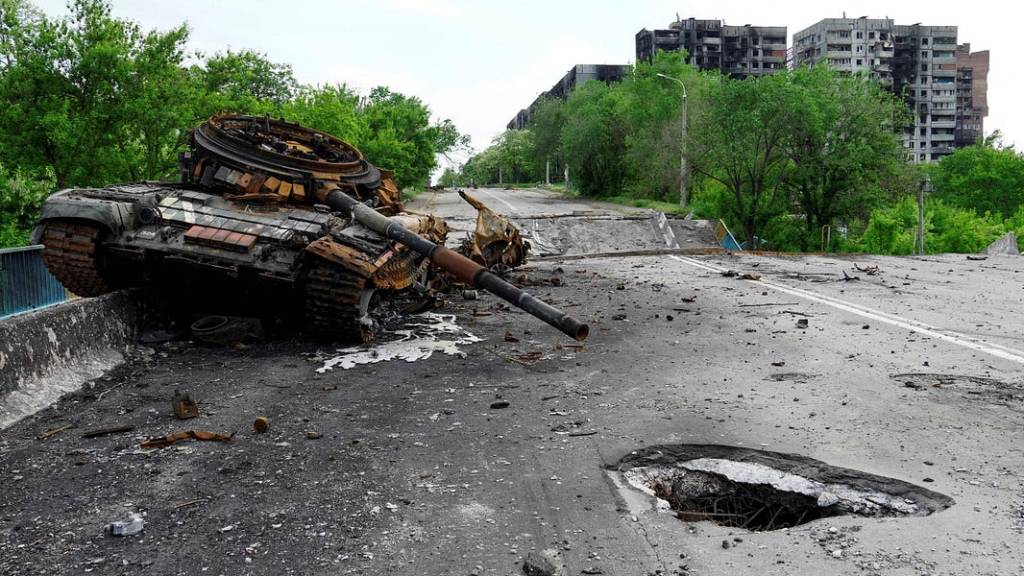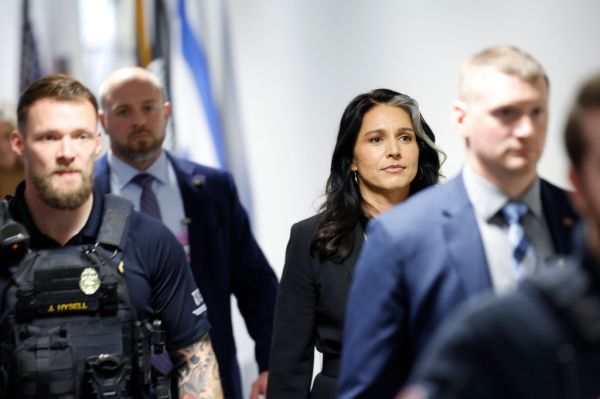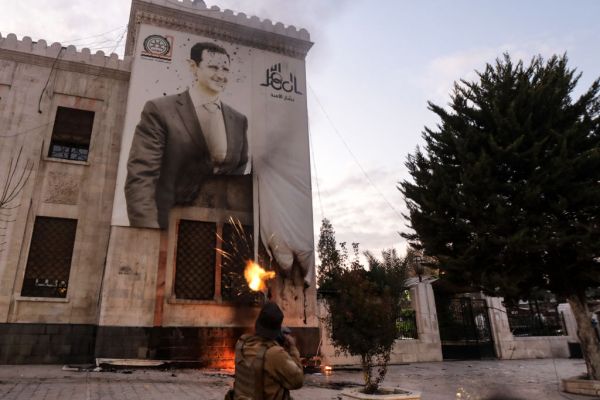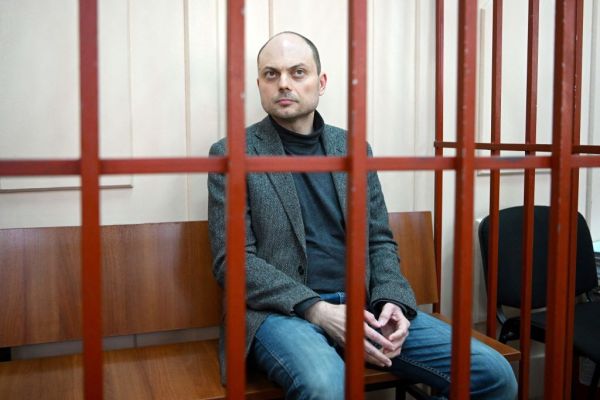On February 24, the world’s most powerful Christian nationalist went to war, at the helm of what many people considered to be one of the world’s most potent militaries. Russian President Vladimir Putin spent more than two decades—exercising more power than any American president could ever hope to possess—forging church, state, and culture into an (allegedly) mighty instrument of raw, anti-woke national power.
And what have we seen? An incompetent army has raped, looted, and murdered its way across the Ukrainian countryside. Even its elite units lie in shattered ruins outside key Ukrainian cities, and a Ukrainian counterattack is breaking the Russian line. While the Russian elite cries for “holy war” in front of a listless crowd of state employees, the men who would be holy warriors run for the border, eager to escape conscription by any means possible.
There are spiritual lessons here. When advanced nations collide in sustained combat, it’s not just armies that confront each other, but systems and civilizations. Hidden strengths emerge. Hidden weaknesses are exposed. And as we watch history unfold in eastern Ukraine—Russians retreating on the battlefield, Russians fleeing their own country en masse to avoid the fight, and a panicked Putin threatening a genocidal response—we are watching in real time a profound and meaningful example of the fatal weakness of Christian nationalism.
It’s not a model of national renewal. It’s a blueprint for corruption, brutality, and oppression.
To understand what I mean, it’s necessary to understand the modern Christian nationalist project. It has multiple salient characteristics. First, it begins with a case for extreme crisis, typically rooted in the argument that modern “wokeism” or the “globalist uniparty” has not only seized absolute control of every key cultural and economic institution, it also aims to wipe out the church and destroy traditional Christian civilization.
Second, it declares that this existential threat can only be met and addressed with government force. The government—goes the argument—is the last institution still open to defenders of the faith, and it is to the government they must turn to, for example, “reward friends and punish enemies.”
Third, government power should explicitly tie itself to a specific allegedly Christian moral vision. The hard version of this is Catholic integralism, which would create strong bonds between the Catholic church and the state. The soft version is slightly more ecumenical and embodied in the national conservatism “statement of principles” signed by all the leading lights of new right nationalism: “Where a Christian majority exists, public life should be rooted in Christianity and its moral vision, which should be honored by the state and other institutions both public and private.”
Fourth, character isn’t just optional in the pursuit of power, character can be an impediment to necessary political victory. This last sentiment doesn’t just reflect elite nationalist sentiment, it also reflects popular Evangelical will. As our own Nick Catoggio pointed out last week, Evangelicals have gone from the American demographic allegedly most concerned about the importance of character in politicians to the least concerned.
When you understand these elements, it becomes much easier to understand pre-war right-wing fascination with Putin’s regime and even the post-war rationalization of his brutal invasion.
Putin has spent years tying himself to the Russian Orthodox Church and portraying himself as a defender of Christian civilization. All the way back in 2014, former National Security Agency analyst John Schindler was sounding the alarm about Putin’s “Orthodox jihad.” Putin forged an ideological “fusion” between the Russian Orthodox Church (ROC) and the FSB. The ROC even dedicated a church at the FSB’s Moscow headquarters.
Here was Christian nationalism in the most formal sense, and the church went right along. Here’s Schindler:
ROC agitprop, which has Kremlin endorsement, depicts a West that is declining down to its death at the hands of decadence and sin, mired in confused unbelief, bored and failing to even reproduce itself. Patriarch Kirill, head of the church, recently explained that the “main threat” to Russia is “the loss of faith” in the Western style, while ROC spokesmen constantly denounce feminism and the LGBT movement as Satanic creations of the West that aim to destroy faith, family, and nation.
Russia has even gone so far as to adopt a term called “spiritual security” which “gives the ROC a mission in defending Russia from negative Western spiritual influences, in partnership with Moscow’s intelligence agencies.”
This rhetoric was constant from the Russian church and the Russian president, and American nationalists took notice. In 2021 my friend Rod Dreher praised a Putin speech that attacked western “cancel culture” and gender ideologies with these words:
Whatever else you think of him, Putin is telling the God’s honest truth here.
See, this is the thing. Putin, Orban, and all the illiberal leaders that our baizuocracy loves to hate are all completely clear and completely correct on the society-destroying nature of wokeness and postliberal leftism. (Emphasis in original.)
In the run-up to the Ukraine war, Tucker Carlson condemned “hatred” of Vladimir Putin and famously asked, “Has Putin ever called me a racist? Has he threatened to get me fired for disagreeing with him?” In a podcast just prior to Russia’s invasion, Steve Bannon declared “Putin ain’t woke. He’s anti-woke.” His guest, Blackwater founder Erik Prince, said, “The Russian people still know which bathroom to use.”
Even well after the war, the rationalizations continued. In a viral video (now viewed almost 2.5 million times) Jordan Peterson excused Russia’s invasion like this:
And are we degenerate in a profoundly threatening manner? I think the answer to that may well be yes. The idea that we are ensconced in a culture war has become a rhetorical commonplace. How serious is that war? Is it serious enough to increase the probability that Russia, say, will be motivated to invade and potentially incapacitate Ukraine merely to keep the pathological West out of that country, which is a key part of the historically Russian sphere of influence?
Moreover, parts of the right didn’t only like Putin’s attacks on the woke west, they also loved his masculine propaganda, especially in contrast with the “feminized” United States. We can’t forget how popular right-wing personalities (and even a U.S. senator) fell for outright Russian military propaganda. We can’t forget this bit of snark, posted the day of the Russian invasion:
How has the Ukrainian government defied expectations? And how could Russian Christian nationalism fail so badly? How could two decades of state power and indoctrination create a debauched army, a listless population, and a series of catastrophic, bloody military defeats? And if the west is so decadent, how did a liberalizing, westernizing Ukrainian military produce a series of military victories that have astounded perhaps even themselves?
Why did Christian nationalists get Russian power so wrong?
Historians will soon be debating and exploring these questions at book-length, but let me open with three simple explanations of Russian weakness and depravity. Power corrupts, christendom dilutes Christianity, and brutality isn’t strength.
Power corrupts. If you speak to any close observer of the war, they’ll note immediately that the Russian military, Russian government, and much of Russian society is thoroughly corrupt. They’re corrupt to the extent that the Russian military that existed on paper was almost completely fictional. In reality, units were undermanned, underequipped, and improperly serviced.
It’s a simple law of human nature that the more unaccountable power one accumulates, the more prone one is to corruption. That law applies to religious power (or Christian nationalist power) just as much as any other form of power.
This is especially true when the alleged “emergency” of the moment not only makes character optional, but also scorns a commitment to character as evidence of “weakness” or “softness” in the face of the enemy. Yet combine power with vice, and you only compound the corruption that hollows out institutions. Corrupt leadership does not create healthy nations.
Christendom dilutes Christianity. When Christian nationalists speak of the use of state power to advance and fortify Christian values and support the Christian church, they are truly talking about sustaining and protecting Christendom, not Christianity. Think of the distinction like this: Christianity is the faith, Christians are the believers in the faith, and Christendom is the collective culture and institutions of the faith.
The danger of a focus on Christendom rather than the radical personal renewal and redemption that is the heart of Christianity is exactly what Søren Kierkegaard identified in his Attack on Christendom. In a series of essays, Kierkegaard aimed directly at the malignant impact of the Danish state church on authentic Christianity, and his complaint applies across other churches in other nations. I’ve written about this before:
The University of Chicago’s Russell Johnson has argued that “for Kierkegaard, an essential part of the Christian life is self-examination and imitation, finding oneself confronted by Christ and beckoned to follow.” But as Kierkegaard himself wrote, “the imitation of Christ is really the point from which the human race shrinks.” In that sense, he was profoundly pessimistic. “If there is emphasis on this point,” he wrote, “the stronger the emphasis the fewer the Christians.”
If, on the other hand, “there is a scaling down of this point”—on the imitation of Christ—“so that Christianity becomes, intellectually, a doctrine,” then Christianity may well grow. But regardless of numbers, the more the imitation of Christ is lost, the more the actual faith is diminished. This is the “abolition” Kierkegaard feared, the end of the faith regardless of the power of its institutions or the numbers of its members.
And what is Putin’s Russia but an unchristian instrument of violent Christendom? Its citizens overwhelmingly identify as Russian Orthodox, but they don’t go to church, and the percentage of citizens who identify as “highly religious” (only 17 percent) makes Russia only half as religious as America’s least religious state.
In fact, Christendom doesn’t just dilute Christianity, it can clash with it. Some of Christianity’s most famous martyrs were executed under the authority of corrupt Christendom. Even today, courageous and faithful Ukrainian Christians are on the front lines confronting Russian Christendom, and faithful American Christians are pouring humanitarian aid into Ukraine. Christendom is not Christianity, and we should stop pretending it is.
Brutality isn’t strength. Nor is it masculinity. I should be surprised by right-wing gullibility in the face of “masculine” Russian propaganda, but I’m not. We’ve spent the last seven years watching the MAGA movement absurdly recast Donald Trump as a defender of American masculinity and Trumpism as an inherently masculine political movement.
Bullies look strong. They strut and peacock. Russians bomb civilians. They rape women. They loot empty homes. They’re ruthless. They make commercials casting themselves as fearless, fearsome warriors. And now they’re fleeing by the thousands, thrown into headlong retreat by a far smaller nation, fighting with a fraction of the resources, in one of the most shocking military setbacks in modern times.
Brutality is meeting courage, and courage prevails.
Russia is not America. We have too many checks and balances for any person to assume Putin-like control over the United States. But those who see the left as an existential threat, who seek ever-greater Christian power to punish their enemies, and who believe character is optional (or an outright luxury) in leaders should look across the Atlantic.
Fields of burning tanks, throngs of fleeing civilians, and shouts of “holy war” to listless crowds should remind us all that the health of the church is not rooted in the authority of the state. The failures of Putin’s brutal Christian nationalism serve as a terrible reminder that the cannonade contradicts the spirit of the cross, and that only sacrificial love can truly redeem a land that is lost.
A preview of coming attractions …
I’m going to be writing very soon about an absolutely fascinating survey of the beliefs and values of American college students. I would have written about it this week, but the news from Ukraine was simply too pressing. There is one statistic that stood out, and it’s this:
-
Homeschooled and parochial schooled undergraduates are as or more likely to identify as LGBT or non-binary as those from public or private school backgrounds.
I’ve got a homework assignment for you. In the comments, tell me why you think this is true. I’m not familiar with parochial school culture, so I don’t have many useful thoughts. But I’ve been immersed in or adjacent to Evangelical homeschool culture my entire adult life, and I have thoughts. Before I share mine, however, I want to hear yours.
One more thing …
This week’s Good Faith podcast was one of my absolute favorites. We talked to James Choi, a professor of finance at Yale University, and it was just chock-full of practical financial and spiritual wisdom. The conversation starts with a survey of Christian self-help commentary about personal finance, and it ends with a discussion of Professor Choi’s decision, early in his adult life, to be very public about his faith even as he pursued a career in the elite academy. Give it a listen. You’ll be glad you did.
One last thing …
I live in the same neighborhood as one of my favorite artists, JJ Heller, and I run into JJ and her husband David all the time. They’re wonderful folks, and this new song is beautiful. It’s grounded in grace and begs us to see the humanity in our neighbors, even when we disagree. Enjoy:









Please note that we at The Dispatch hold ourselves, our work, and our commenters to a higher standard than other places on the internet. We welcome comments that foster genuine debate or discussion—including comments critical of us or our work—but responses that include ad hominem attacks on fellow Dispatch members or are intended to stoke fear and anger may be moderated.
You are currently using a limited time guest pass and do not have access to commenting. Consider subscribing to join the conversation.
With your membership, you only have the ability to comment on The Morning Dispatch articles. Consider upgrading to join the conversation everywhere.